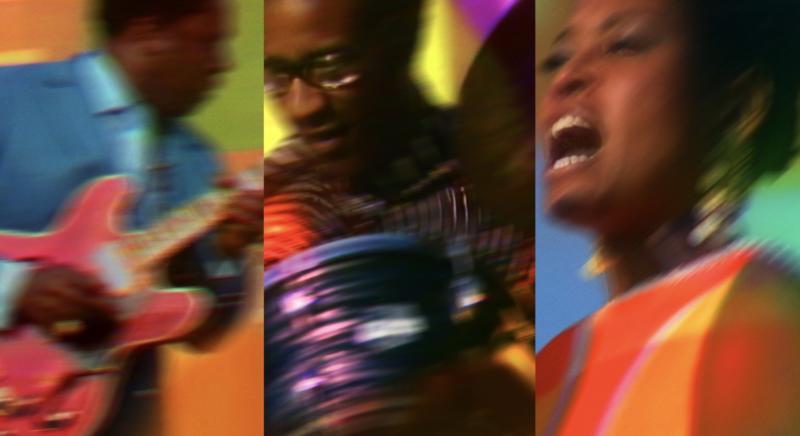From rhythm and blues to Latin and everything in between, the 1969 Harlem Cultural Festival was more than just six weeks of multi-genre musical celebrations. It was a movement — a moment in history that shaped how Black people could be prideful and push the cultural revolution of Blackness. Hosted and produced by Tony Lawrence, the Harlem Cultural Festival became home to some of the nation’s most iconic entertainers and performers of the day.
Gracing the stage in their best fashions, each artist translated the signs of the time through the healing mechanism of music and art. Held at a time where Black America had taken some L’s, the festival served as a bedrock of hope and an exclamation that Black is here, Black is strong and Black will survive.
Footage of the festival was held in a vault for over 50 years, so few people knew the significance of this historical moment. Now, the tea has been spilled, and we’re all drinking in the beauty of this defining moment in Black history. Directed by five-time Grammy Award-winning artist Questlove, Summer of Soul (…Or, When the Revolution Could Not Be Televised) tells the story of the 1969 Harlem Cultural Festival and its relevance not just to Black America but to the world. Currently playing in theaters and streaming on Hulu, here’s some of what you can expect to see in the film.
Blackness Is Not Monolithic
A Black group that was low-key out of this world, 5th Dimension brought a new futuristic sound to the stage. People often had a hard time determining whether these performers were Black because of their nontraditional sound. However, that ambiguity didn’t last. Singing the hit “Aquarius/Let the Sunshine In,” the group wowed the crowd with whimsical dance moves and piercing harmonies. When 5th Dimension took the stage in Harlem, they removed all the doubt about who they were and what they represented.
Church, Church and More Church
Can you really discuss the depths of Black music without talking about gospel? The answer is no. With performances from gospel greats like Edwin Hawkins, The Staple Singers and the incomparable Mahalia Jackson, the spirit was definitely high in then-Mount Morris Park. After the deaths of Malcolm X, John F. Kennedy, Robert Kennedy and Dr. Martin Luther King, Jr., gospel music became even more paramount to the movement and urgency of Black people. Gospel fused faith and the culture and made it all make sense.
The Motown Sound
Without question, Berry Gordy and Motown changed the very meaning of soul music. Motown made R&B and soul ubiquitous, and it helped create the soundtrack to the Black movement. The pervasiveness of this sound transcended to the main stage of the Harlem Cultural Festival with the smooth sounds of “My Girl,” as performed by David Ruffin, and “Grapevine” by Gladys Knight and the Pips.
Spanish Harlem and Beyond
It’s more than obvious that the 1969 Harlem Cultural Festival was a FUBU situation. However, it was very intentional about merging the communities and celebrating the unity found among Black and Brown people. With representation from Mongo Santamaria, Ray Barretto and Hugh Masekela, festival attendees could shift from the soul train line directly into the salsa. Celebrating the beauty and range of culture among people of color, Summer of Soul (…Or, When the Revolution Could Not Be Televised) highlights the political statement of unity and peace while appreciating the beautiful meeting of Cuban and Latin music with jazz and R&B.
Back to the Future
Picture this: You’re at the festival of the year. You and your homies are hyped. The host comes to the stage and announces, “Up next, Sly and the Family Stone!” Immediately, there’s silence. No one’s sure if the group is actually about to hit the stage. Then, bam! Out comes one of the most eclectic groups of the time. With a white drummer, a woman on trumpet and a Black lead, the group personified their hit song “Everyday People.” Sly and the Family Stone may have represented everyday people, but they knew this one was for THE people.
The Moon?
Parallel to the Harlem Cultural Festival, a man landed on the moon. You know who didn’t care? The Black festival goers. When interviewed by local news outlets, every person seemed completely underwhelmed by the moment. So much so, that comedian Moms Mabley and ventriloquist Willie Tyler created sets undermining the scientific breakthrough and repositioning the focus on what really mattered: the celebration and awareness of Black culture and mobility.
Summer of Soul (…Or, When the Revolution Could Not Be Televised) shows just how much of a vibe the 1969 Harlem Cultural Festival was. With its well-executed logistics, mind-blowing performances and historical magnitude, the film highlights the depth and beauty of a time that some have forgotten and others never knew. The revolution may not have been televised then, but Questlove took on the task. And no doubt about it: he understood the assignment.
To see captivating performances and learn a piece of history we all deserve to know, watch Summer of Soul (…Or, When the Revolution Could Not Be Televised) now playing in theaters and streaming on Hulu.
This editorial is brought to you in partnership with Searchlight Pictures.

